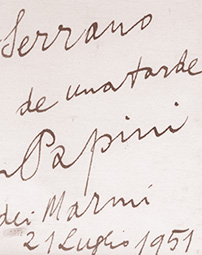
“He will never be able to know what it meant for me to find him.”
I start my conversation by telling him that I have very recently been with Hermann Hesse. I express myself poorly, saying that he expressed to me that the fundamental thing in life is to try to hear the voice of God. Hesse has not said such a thing to me, but rather at the bottom of every religion is the voice of God. But I do not manage to correct myself, since he responds to me: “In this statement there is nothing new.”
“What matters,” he adds, “is whether God has any interest in talking to men. Then, if men are able to hear God, whether it is to them that He speaks. And, finally, if men can interpret the voice of God, whether they listen.”
Of Hermann Hesse, Papini only knows his book Siddhartha. I notice that in Europe writers are ignored more than in South America.
Then we speak of his article commenting on South America. Papini elaborates on this. He says that it has been misinterpreted, that he has not discounted the possibilities for the future of our continent, and that he only said that to the present time we have not produced neither a Cervantes, nor a Dostoyevski, neither a Saint John of the Cross, nor a Napoleon.
It seems to me that I sense in Papini a strange concern and affection for South America, which, in a passionate and polemical temperament like his, was manifested by attack and criticism. In the darkness of that evening, he drew near and asked me:
“Are there many Indians in South America? Are you Indian…? I fail to see it, because I am almost blind…”
His wife smiles. And she says to him that I do not seem to be.
Papini then begins to talk about Europe. With great fervor he expresses his view of the world, and tells me that he believes that Europe will always be the head of the world; because there they have the necessary constants of danger and insecurity, and extreme tensions which make the spirit stay ever vigilant. This is the most propitious terrain for the highest creations and the resurgence of the best individualities. Europe looks like Greece, at a broader level; divided into nations, always facing the danger of barbarian invasion, they must create and overcome in order to survive. The Latin World has a great part to play in this struggle and in the final equilibrium. Italy, Spain, France and South America (which is also Latin in spirit, says Papini) are essential for the integration of the world of the future. Catholicity is the element without which there would be chaos.
I remember that Keyserling -who in my point of view is one of the most authentic South American writers, and who will become still more so, as time passes- said that the spirituality of Europe is due to it’s division and polarization between small nations. And one of the reasons why he believed that in South America the advent of the spirit is also be possible, is that it is divided into nations like Europe.
The time has passed. Papini stops chatting and goes up to his work room, in search of his latest book. In his absence, his wife offers me a cup of coffee, and tells me that the writer has had a bad year, as he has been very sick. Papini’s wife is a beautiful and friendly woman.
“How hard Giovanni has worked in his life!” she tells me.
Returning, the writer brings me his last book, printed in Italian: Le pazzie del poeta (the madness of the poet). And he dedicates it to me, writing in Spanish: your friend of an evening.
Afterwards they both accompany me to the car waiting for me. As the night is dark, Papini relies on my arm and on his cane. He walks very upright in the shadows. Both he and his wife want me to stay and eat with them, and their warmth is touching. Papini asks me if I have the money for the taxi or if I brought enough for my trip to Italy. That fighter, that poet, looking for new ways to express his sympathy for this South American, a friend of an evening.
At night, listening to the crash of the Mediterranean waves, I feel close to this fighter that I so much admired, and cannot help but wonder at destiny, that has permitted me to come here, to this old world, back to my distant adolescence.
Papini will never be able to know what it meant for me to find him and his Florence: a return to those years when we were free, because all the roads lay still ahead of us…
Páginas: 1 2




